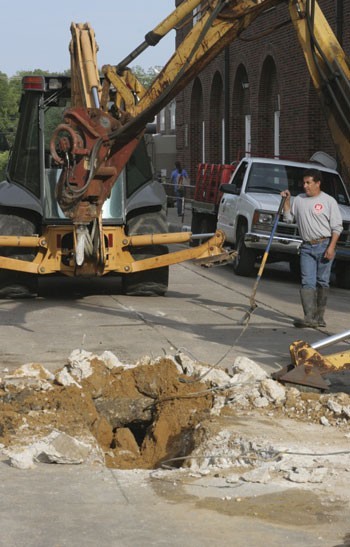
Water main breaks on McFarlin Road (Photo by Cole Hill, The Daily Campus)
Crews worked through the night to fix a broken water main that cut water flow to the Hughes-Trigg Student Center, Clements Hall and Fondren Library.
Plumbers who were working on general repairs in the student center alerted Campus Planning and Plant Operations officials at approximately 4 p.m. Thursday that the water pressure had dropped in the building.
CPPO workers discovered the water main that runs underground and parallel to McFarlin Blvd. broke and flooded a nearby underground chamber that holds three, 13,200-volt electrical transformers and a transverse switching unit that distributes power from the transformers to the student center and Fondren Library building.
The main is a 12-inch metal pipe that supplies the fresh water to Hughes-Trigg, Clements Hall and Fondren Library.
Crews pumped the water out of the chamber, but there was still some concern by officials that power could be lost to the buildings. Throughout Thursday afternoon, lights were flickering in the student center, but power was never completely shut down.
Workers identified the leak and completed the repair shortly before 10 p.m. To fix the immediate problem, a “band aid” was bolted on to the pipe, according to Wayne McKenzie, manager of carpenters, painters, service workers and locksmiths. The high-pressure metal clamp wraps around the pipe so crews can turn the water back on.
Before the repair was complete, water pressure had to be released from a nearby fire hydrant, setting off fire alarms in Hughes-Trigg and Clements Hall.
McKenzie said plumbers would further investigate the cause of the break and determine how to proceed. At the least, a coupling can be permanently attached to the pipe, at worst; the section of pipe will have to be replaced.
McKenzie added crews will work feverishly to complete the final repairs, but it could take as long as a week to finish the project.
Crews used heavy machinery and hand-held jackhammers to break through the concrete on McFarlin Blvd. to find the exact location of the break.
CPPO electrician Joe Jenkins said water main breaks are common, especially in the dry weather conditions the North Texas area is currently experiencing. The dry weather causes the ground to shift and the main to break. Jenkins added the older the pipe is, the more susceptible it is to breaking.








